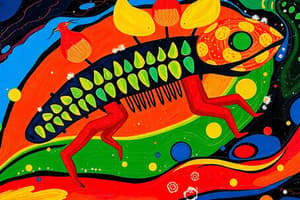Podcast
Questions and Answers
What is the process by which living organisms extract energy from food?
What is the process by which living organisms extract energy from food?
- Excretion
- Growth
- Respiration (correct)
- Movement
How do plants primarily respond to stimuli compared to animals?
How do plants primarily respond to stimuli compared to animals?
- Plants respond slowly, while animals respond quickly. (correct)
- Plants respond more quickly than animals.
- Plants and animals respond at the same speed.
- Plants have no response to stimuli.
Which life process ensures the continuation of a species?
Which life process ensures the continuation of a species?
- Reproduction (correct)
- Respiration
- Excretion
- Movement
What is not a function of excretion in living organisms?
What is not a function of excretion in living organisms?
Which life process involves awareness of environmental changes?
Which life process involves awareness of environmental changes?
Which of the following describes the growth of animals compared to plants?
Which of the following describes the growth of animals compared to plants?
Why is respiration crucial for all living organisms?
Why is respiration crucial for all living organisms?
What distinguishes excretion from egestion?
What distinguishes excretion from egestion?
What is the primary distinction between sexual and asexual reproduction?
What is the primary distinction between sexual and asexual reproduction?
How do plants obtain their nutrition?
How do plants obtain their nutrition?
Which of the following best defines heterotrophic nutrition?
Which of the following best defines heterotrophic nutrition?
What is the role of chlorophyll in photosynthesis?
What is the role of chlorophyll in photosynthesis?
Which type of heterotrophic nutrition involves organisms that feed on dead organic remains?
Which type of heterotrophic nutrition involves organisms that feed on dead organic remains?
What is a characteristic feature of holozoic nutrition?
What is a characteristic feature of holozoic nutrition?
Which of the following correctly identifies autotrophs?
Which of the following correctly identifies autotrophs?
During photosynthesis, what happens to water molecules?
During photosynthesis, what happens to water molecules?
Flashcards are hidden until you start studying
Study Notes
Life Processes
- Life processes define characteristics of living organisms, which are called organisms.
- Seven essential life processes determine whether something is living or non-living.
Movement
- Both animals and plants exhibit movement; animals move quickly while plants move slowly as they grow.
- Plant movements include roots growing downward and stems reaching toward light.
Respiration
- Respiration refers to energy extraction from food, taking place in the mitochondria.
- Essential for growth, replacement of worn parts, and movement.
Sensitivity
- All living organisms are sensitive to environmental changes, responding to stimuli like heat, light, and sound.
- Animals generally react quickly, while plant responses are slower.
Growth
- All living organisms experience growth; plants continue to grow throughout their lives, while animals stop growing at adulthood.
- Replacement of materials occurs in the bodies of animals even after growth halts.
Excretion
- Living organisms produce waste that must be expelled to avoid harm, known as excretion.
- Plants remove waste through fallen leaves, while animals excrete carbon dioxide and waste products via urine and sweat.
- Egestion, the removal of undigested food, is not classified as excretion.
Reproduction
- Organisms must reproduce to ensure species survival.
- Plants produce seeds for new plants, while animals reproduce through eggs or offspring.
- Reproduction occurs in two forms:
- Sexual (involving two parents)
- Asexual (single parent reproduction)
Nutrition
- Nutrition is crucial for energy and growth; plants are autotrophs that produce their own food via photosynthesis, while animals are heterotrophs relying on other organisms for nutrition.
- Autotrophs convert inorganic substances into organic ones, while heterotrophs depend on consuming complex organic matter.
Autotrophic Nutrition
- Organisms synthesize organic materials from inorganic sources, primarily using sunlight for energy.
- Photosynthesis involves several steps: light absorption by chlorophyll, conversion to chemical energy, and carbon dioxide reduction to carbohydrates.
Heterotrophic Nutrition
- Heterotrophs rely on autotrophs for nutrition, categorized into three types:
- Holozoic: Involves ingestion and digestion of complex food (e.g., humans, amoeba).
- Saprophytic: Involves feeding on dead organic matter (e.g., fungi).
- Parasitic: Organisms take nutrients from hosts without benefiting them (e.g., ticks, tapeworms).
Studying That Suits You
Use AI to generate personalized quizzes and flashcards to suit your learning preferences.




